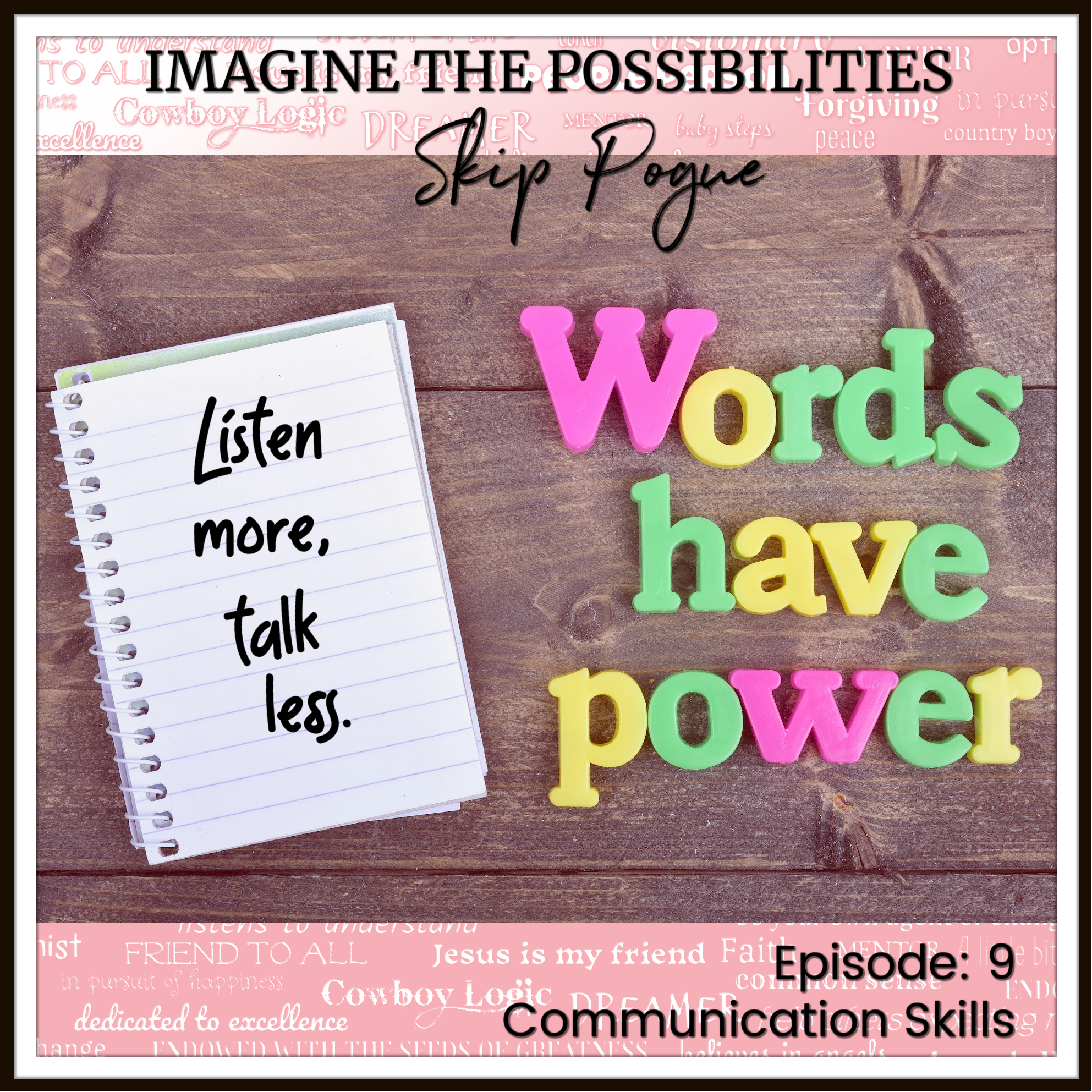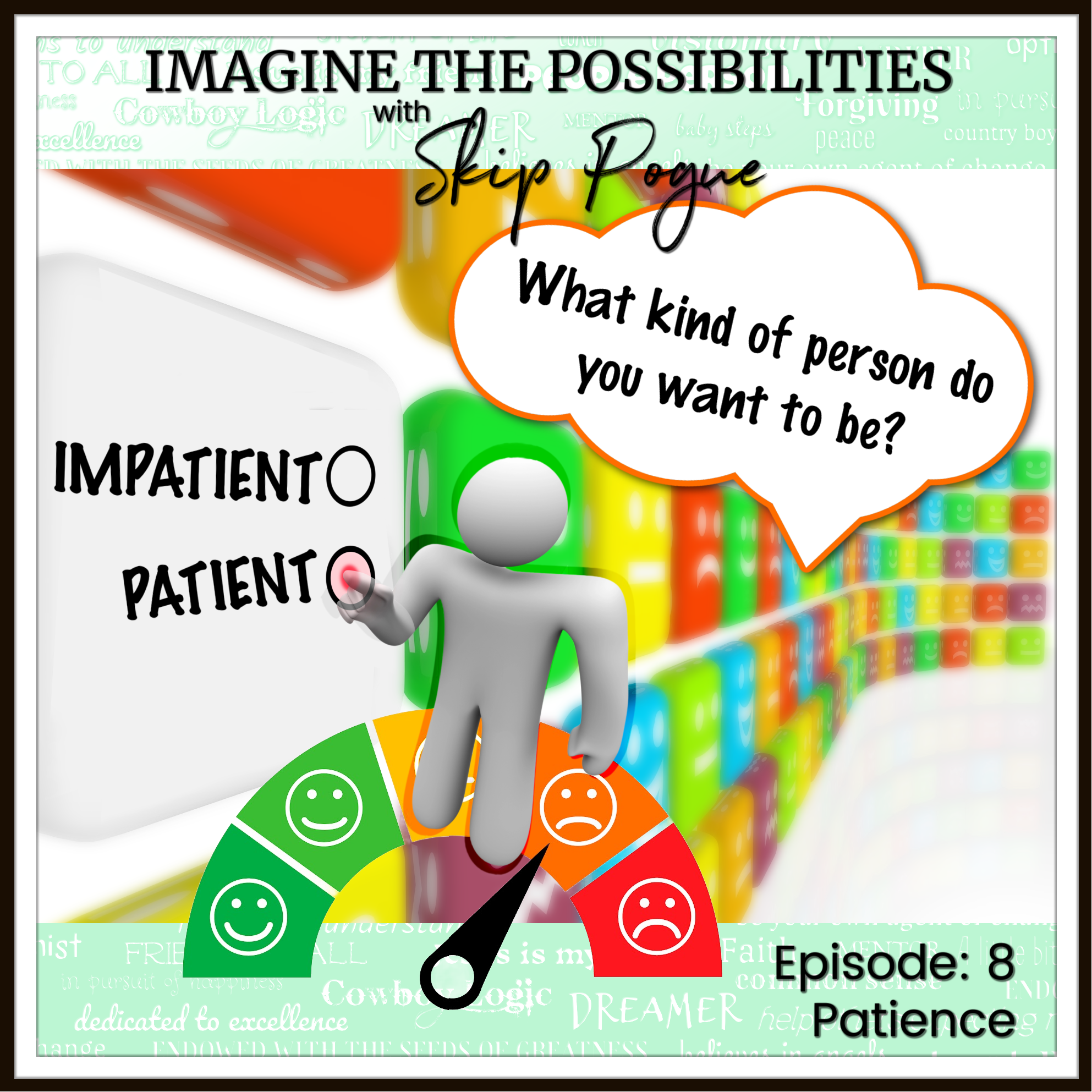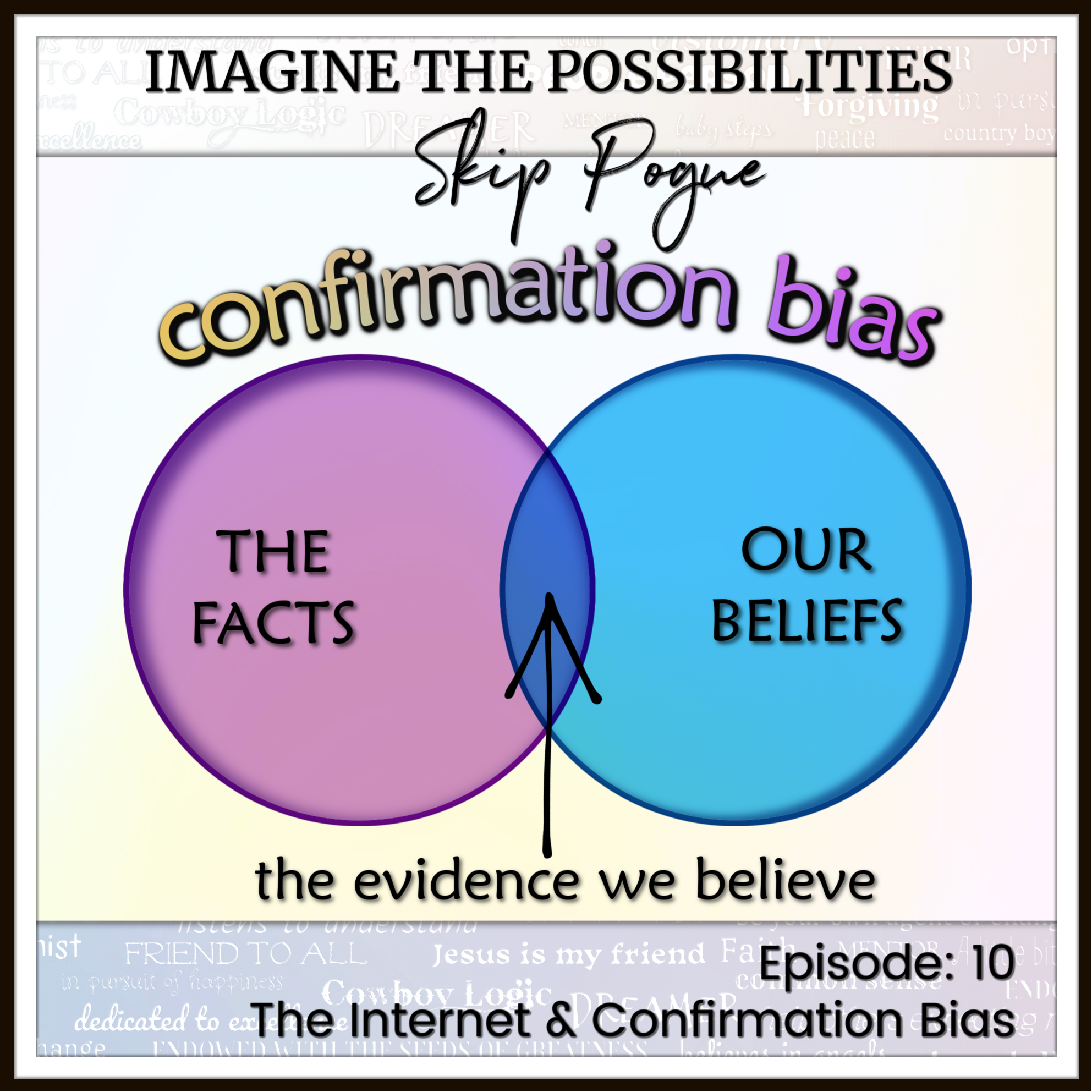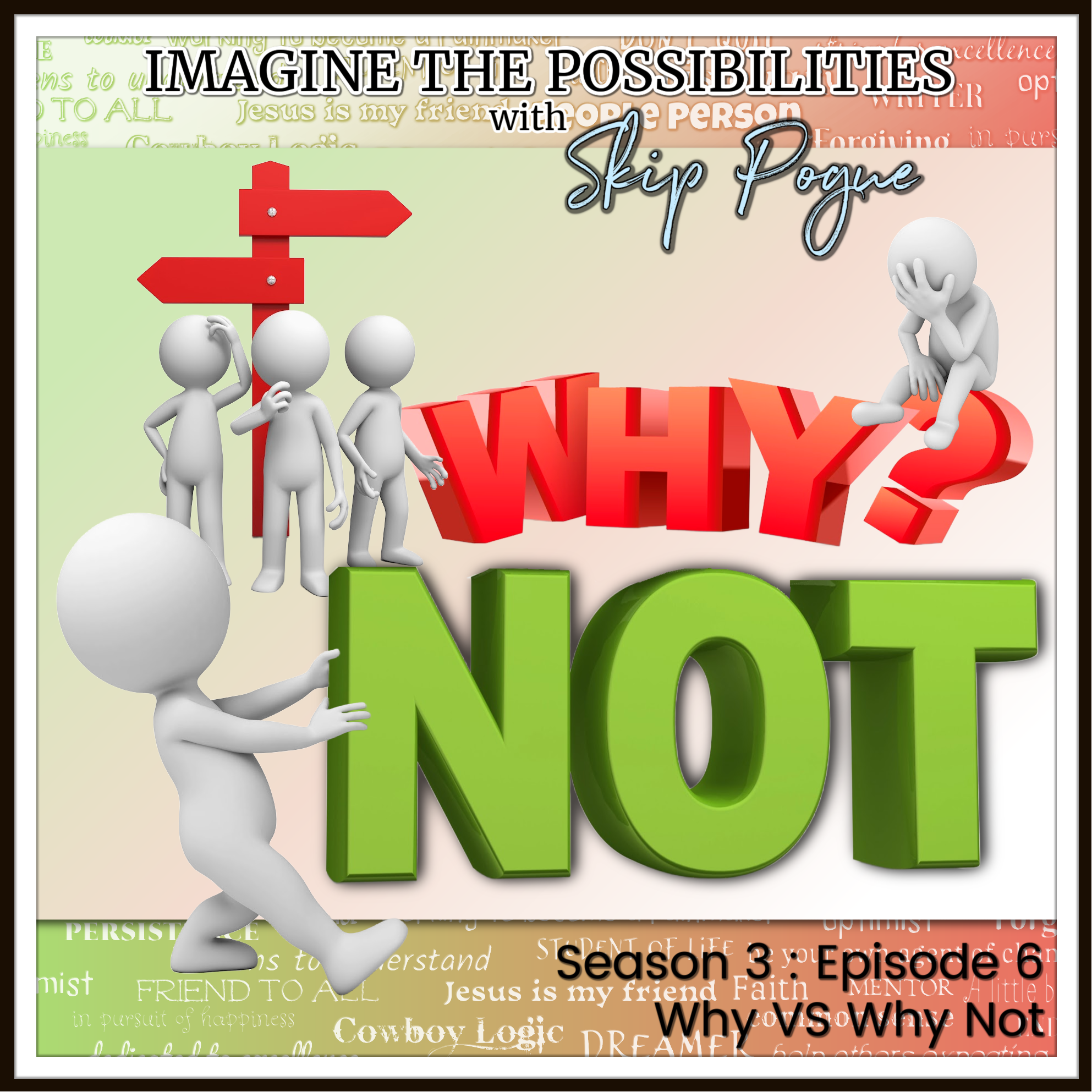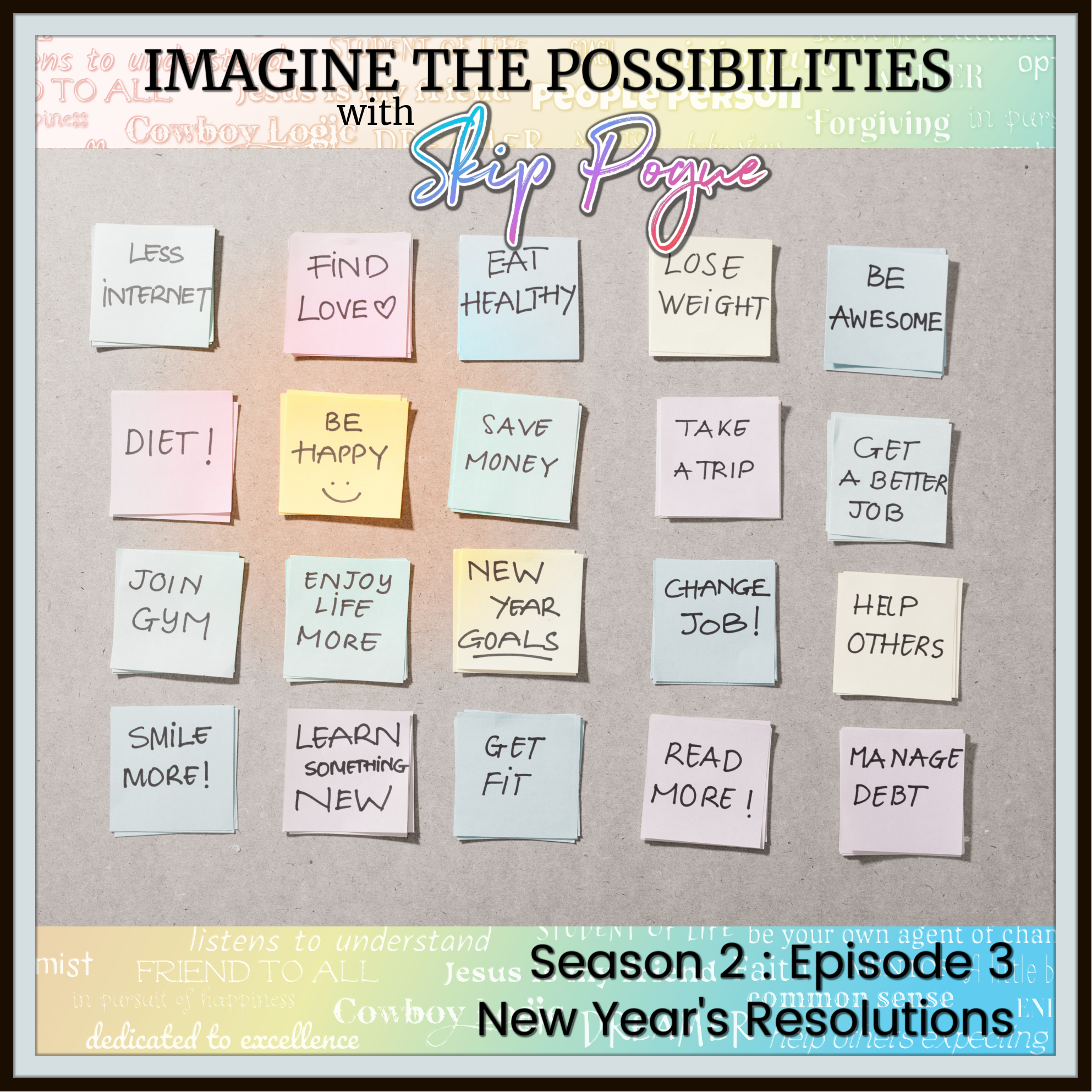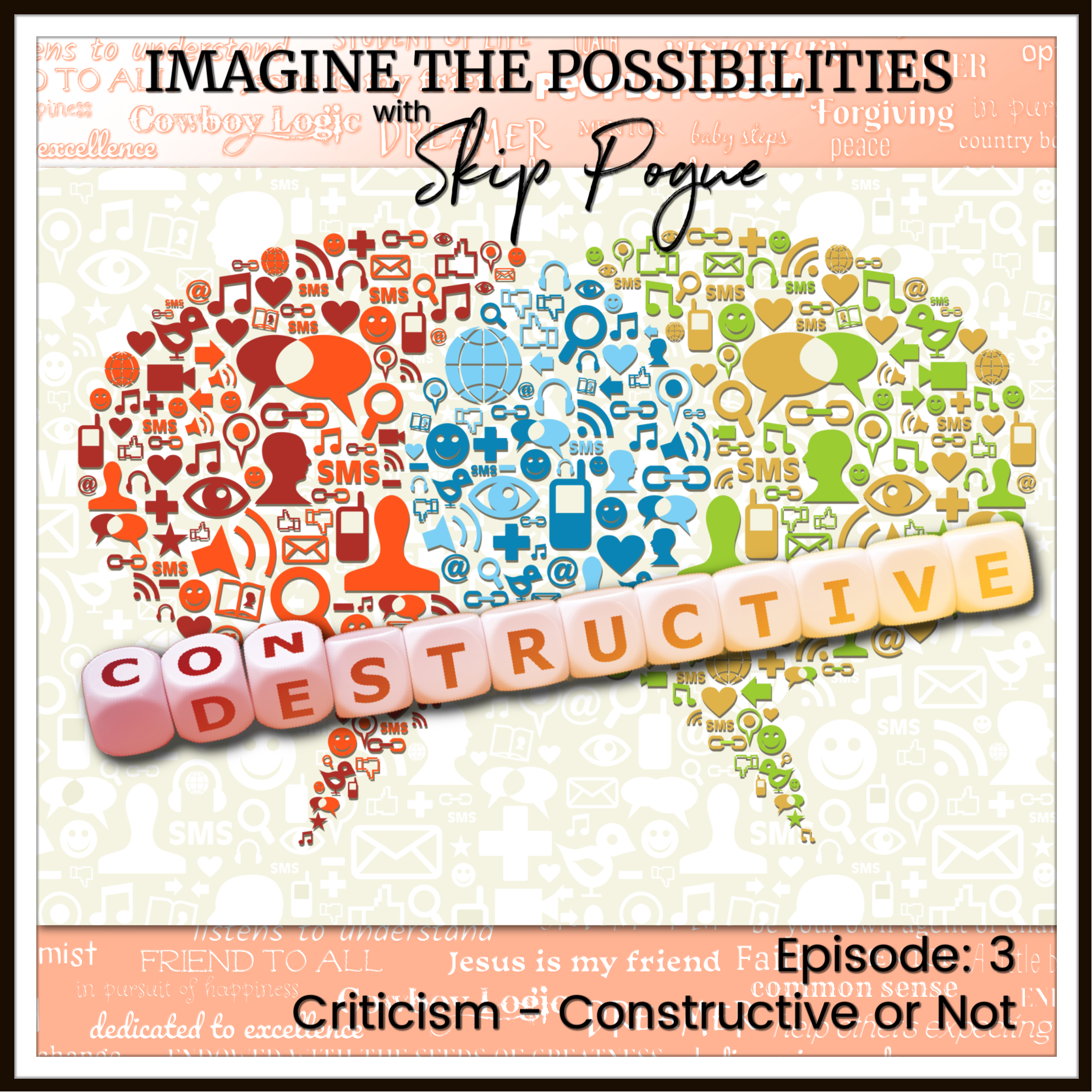Today we're exploring one of the most important skills we often overlook: truly listening to each other. Too often, we listen to respond instead of listening to understand, missing the chance for genuine connection. Through stories from my life, I'll share insights on improving verbal communication, paying attention to body language and tone, and practicing empathy. Whether at work, in marriage, or personal growth, active listening is a skill that enriches all areas of our lives. Thanks for joining me, and let's dive into ways we can communicate better.
View Full Transcript
Episode Transcript
[00:00:01] Hello and welcome to Imagine the Possibilities. My name is Skip Pogue. Today I want to talk about communication and how we communicate with each other, and primarily about verbal communication. I think we've probably all done this. I know I have, and I've tried to get better about it and stuff. But how many times have you been in a conversation with somebody, maybe just started the conversation, and you're not listening to them, not really listening. You're not listening to understand, you're listening to respond. Think about it. You're just waiting for that opportunity to come up where you can actually give them the answer or the answer you think they want because you haven't been paying attention. Like I said, I've done it. I probably still do it at times. I don't think anybody's perfect at anything. So if I say I do it once in a while, then that once in a while, maybe 1% of the time. But how many times have we done that? We're listening to somebody and they're explaining a situation and stuff. And maybe they're part of the conversation has been going on for a minute and a half at this, at the 62nd mark, we already knew the answer or we thought we did. So when they finally do give us a break, we've not made any attempt to communicate with them. Simply standing there listening, are supposedly listening. And when they finally give us that opportunity to respond, we give them the answer. Then they tell us, well, that's not what I said. I didn't say any of that. We never took the time while we were supposedly listening to question them. When they had. When we had an opportunity to question about what they were saying. We never took the time to go back and give them verbal feedback on what they had said, not in the form of a question, but just to clarification so that they would know we were listening because we weren't listening. So those are. It's really important we don't do that. We. We can't solve the problem. We can't give the answer. We can't know what they're talking about if we're not paying attention. If we're not listening to understand we're not listening. And that's just all there is to it. And that's an issue. So moving forward, we have to stop doing that. We need to stand there and listen, sit and listen, whatever, wherever the conversation is taking, we need to listen to understand what's being said. We can ask questions for clarification. We can respond with part of what they've said to us to make sure we're understanding. And it also lets them know, hey, they really are listening to me. And then at the right time, we can respond to whatever their question or whatever the statement was or what we're talking about, but not before the right time. So that's important. If you want to think about the most important area in your life to listen. Probably your marriage. Work's important and everything, but listening in your marriage is probably one of the hardest things and maybe the most important thing you'll do in your life. I can tell you from personal experience, and I'll give you an example. We have two computer desks in our bedroom. So we spend a lot of time in the bedroom at our computer desk. It was the only place in the house we could find that had enough space to do that. And sometimes we also have a TV in the bedroom. So sometimes my wife will be watching TV and I'll be on my desktop computer solving the world's problems or working on another podcast. And she'll say something to me. I didn't really listen. I know what she said, but I couldn't say it back to her, not for a million bucks. Ain't no way that's gonna happen. But I'll respond anyway, because I wasn't paying attention. So the only way I can get out of this is just respond to what I think she said or the question or whatever. And I do that, or I did that. And we wound up taking something that would have probably taken five minutes had I done the right thing to resolve. And we take it from a casual conversation into an argument. And there's one thing that you have to remember about an argument. Nobody. Nobody wins an argument. It's not a debate, it's an argument. It's. You're both upset, nobody's going to win. When it settles down and everything, you're both losers. So don't have the argument. A friend of mine showed me how to resolve or how not to have the argument by paying attention. And I know how to do it. And it's a habit that I develop. You can't do everything 100% of the time. And those times I fail generally wind up us having a more heated discussion than we should have. But how do you. How you solve it is really simple. And Bob wound up mentoring me, and I paid really close attention to this particular thing. The first time I walked in Bob's office, he picked his phone up and called his secretary and told her, unless the house is on fire, don't put any calls through and then he turned around and he had a laptop on his desk, and he closed his laptop. And I was the most important person on the planet to him at that moment. And we had our conversation. And like I said, he. He became a mentor and a really good one of the best friends I ever had. And he was definitely an inspiration to me throughout my lifetime. Bob passed away, and he still sorely missed in my heart. But anyway, he did those things, and he didn't do it just with me, he did it with everybody. And as he became my mentor, he kind of let me discover that, I think from that first conversation. And I emulated Bob after that. If somebody came. When I became a manager, somebody came in my office. I did exactly what Bob did. I didn't have a secretary, so I just took phone and it had a do not disturb button on. I put on do not disturb, went to voicemail. If somebody called, I turned my laptop off. I turned my phone down, my personal phone, so it didn't ring, and I was good to go. I was 100% focused on that person and what their needs were, and that's important. And if I do that with my wife or my children, they're grown now, but still want that same thing or anybody else I'm associated with, the conversations are golden and they don't take long. But when I ignore that and I'm distracted, I'm having a conversation that I'm not involved in, then things go sideways, and the solution, simple. You know, we play. My wife and I play a. We play Lord of the Rings online. It's called lotro, and it's a multiplayer game, and we've played it for a long time. We may be the oldest people playing it, but it's fun and we enjoy it. But if I'm doing something that game and she interrupts me, I may not focus on it. Now I can stop. But if. And if I don't do that, I'm wrong and there's no defense for it. So I've learned that if I'm doing something else and my wife asked me a question, I need to stop. I need to turn around, face her, make eye contact, and have the conversation. I'm happier, she's happier, life is good. So keep that in mind. But we also, when I asked the question about, have you ever formulated a response before you heard the whole conversation or whole question or statement? We all have done that, and that's wrong. So we need to get out of the habit of doing that and focused on the habit of listening to understand, it's okay to ask questions while the other person is talking. It's okay to respond with some of their words to clarify something. Clarification. I'll get it out in a minute. Give me time. This is communication. So.
[00:07:35] So anyway, those things are okay. We need to plaque. We need to practice active listening. We need to do those things, which is part. Both of those are part of active listening, and that's what we need to do. Listening is a skill. It's a learned skill. We're not. We're. We're born with ears, and hopefully they work and. But we still don't know how to listen. So we have to learn how to listen to people. And the words we use are important. The really important piece of it is the volume and the tone of our voice when we're communicating, because we can say something in such a way that somebody thinks we're PO'd and we're not. I've done it with my wife. I've said something, she'll ask me a question or something, and I'm focused on the question, everything. And now, you know, I'll be like, yeah, right, that's great, you know, and she says, you don't even know what I said. And I said, yeah, I do. And I didn't. So even though I was listening, I wasn't listening to understand. So focus on that and make that the mission. Every time you talk with somebody, that you're going to understand them and the response will be a much better. It'll save you time in the long run. So do that. Focus on the person. Body language is important. Facial expressions, you know, even if you're sitting down, there's still body language involved. But to me, the two most important pieces that you can glean information from are facial expressions and volume and tone. Because they'll tell you a world of things about what the person, how they're feeling, what they're really trying to say. Are they upset? Not upset? You know, what can you do? Be empathetic. If a person's upset, be empathetic with them. Practice empathy. If they're not upset and you realize that, then you can have a good conversation. Don't burn bridges. Don't do anything like I did with my wife that causes an argument. I did apologize, and I still do. When I do something stupid, I just. It's better for me to do that than anything else. But as long as I have been involved in work and I'm retired and have been retired since 2010, my family's the Utmost of utmost importance to me, but yet I do that. I don't listen. Even though I went to classes for it and everything else. During my career, communication skills were important. I presented everybody from new hires to corporate presidents and the communication piece of it was great. The biggest fear I had was this right here. If you've listened to the very first podcast I did, I explained it took me two years to get to the point of making that first podcast. And it wasn't fear as much as it was self doubt. And maybe in one way that's the same thing. But it took me a while because I had never done this. I had made recordings and stuff. I had been on panels where they were recorded, videoed and everything else. And a group of editors edited down, made a 30 minute show out of it or whatever and I looked great, you know, but the editing, the editing of any movie, TV show or anything, those people are the masters that really put it together. So they did. My communication looked great. But just pay attention, listen to understand, don't, don't try to formulate a response. There, there's this thing, I don't think it, it, it actually applies. I don't think they realized it would apply. And that's silos. Conversations taking place in silos and business world really was where it became most prevalent. There would be a group of people working on one project or one part of a project and a second group of people working on the other part of the project. Within the silos, within teams, they communicated extremely well. When it came time for the two teams to talk to each other, they didn't because they were in their individual silos. They needed to get out of the silos and, and form another group that, that encompassed everybody. Well. Husbands and wives can be in silos because they each have a different thing on their mind and they're working on a project that may be similar, that's keeping your marriage together and being happy, but they're not communicating well. So they got to get out of the silos and get back into the communication thing where they're able to present what they've, the question, the concern or the desire or whatever they have to the other person. And that person has to be attentive and listening and respond the way they should. So you want to have a good life, especially if you're married or you're engaged or you're dating someone. Communication skills Being able to communicate with each other is extremely important. Don't ever believe it's not. It is. And we need to really work we may need to take a class. I can tell you how what I've experienced, but it may be that you want to take a class if you feel like your lack of communication or your ability to communicate well is maybe not tuned up the way it needs to be. Maybe you want to take a class. Maybe you want to, you know, go to a night class at college. Maybe you just want to go online. There's a lot of people that are very good at helping people online. Maybe you just go on YouTube, Google it, whatever, and find somebody and listen to them and they may be able to explain whatever nuance it is that you're dealing with on a level that helps you. But just take a little bit of time and think about what I've said about listening to understand about communication with especially your spouse. And the neat thing about communication skills is if you get where you can communicate well with your spouse, you spend a lot of time with her or with him. If you can get where you communicate well with them, the skills transferable to your business world, you know, your professional life, that skills transferable. Same thing if you get good or you get to take a class in your professional life, that skills transferable to your personal life. And equally they're either place the personal or professional skill set for listening is transferable to spiritual life. So whichever one helps you the most and gives you the best opportunity to learn a new habit about listening is one you need to go to and then use that skill in other two, personal, professional, and spiritual. The three lives that we lead, and they're equally important. But for me personally, I would list them as my spiritual life, my personal life, my professional life. And the reason I say that is that God's very important to me. And I don't think my wife would disagree that God's more important to our marriage and God helps us through that. So I would say spiritual, personal and professional now, in that order. But when I talk about religion, I'm not trying to make you get a religion. I don't want you to get. I don't want you to go to church. I'm not saying that I don't want you to get religion, but I do want you to get God. Just have a personal relationship with God. It's wonderful, it's great, it's fantastic. Helps you communicate better. Hey, what can I say? But just do those things. Just look at how you communicate today. Work on doing like Bob taught me, paying really good attention, taking away the distractions that you have. Turn your computer off, your phone off, pay attention, make eye contact, body language, verbal tones, your volume and tone and you can communicate better and in all three of those pieces of your life your personal, professional, spiritual life will all be better because of that. Because communication, the way we talk to each other is so, so important. Having said all that I want to tell you something I appreciate so much and you're going to hear me say this every one of these podcasts I do and I am being 100% sincere. It means the world to me that you take time out of your life to listen to me talk about things that I have experienced in my life. So I appreciate so much and thank you and I just want to tell you that you need to remember that your future belongs to you and it really does. Stay humble, be kind, love deeply and laugh often. I hope that you have a super day and I pray that God blesses you in a super way. Thanks again and God bless.
